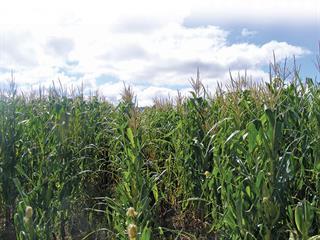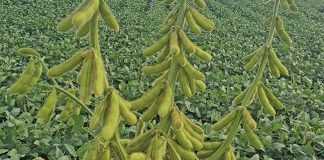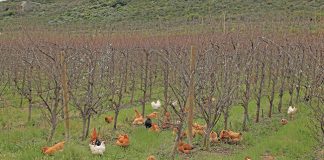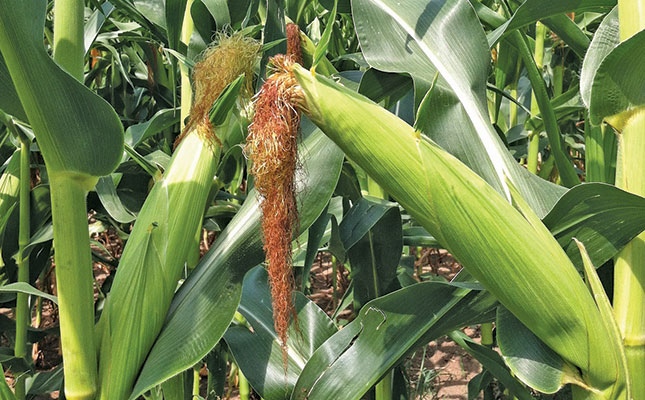
Full-time grain producer David Maleleka bought the farm Brakfontein near Kestell, in the Free State, in 1991 after running a fleet of taxis in nearby Phutaditjaba. He grew up on a farm near Kroonstad and always yearned to get back to the land. “I love it,” he says. “For me it’s a privilege to earn my living from the soil. But it’s not easy – successful farming means total commitment and hard work.”
He tells Farmer’s Weekly that he feels especially blessed that his son Thimba, now 21, joined him on the farm this year. “We must get the younger generation in South Africa involved in farming to ensure continued food production,” says David.
Brakfontein has 250ha arable land and about 15ha veld grazing on which David runs a few head of cattle and sheep for domestic use.
He plants maize, soya beans and dry beans in rotation. The land mainly consists of sandy loam soil. The average annual rainfall is around 650mm, but this dropped sharply to 340mm in the 2014/2015 production season, reflecting general drought conditions in the central part of the country.
David lost 5% of his maize crop and 23% of his soya beans to hail in February. Fortunately, he had insured his crops against hail damage, and – ever the optimist – says the hail has added valuable moisture to the soil.
Soil preparation
The optimum planting time in Kestell is between 20 and 30 October. David prepares the soil for soya and maize early in the season before the first rain, working the stover of the previous crop into the soil by disc, before ripping at a depth of 400mm to 600mm. The seedbed is then prepared by discing. “Germination can be a problem, so we plant soya bean seed at a high density. The tightly growing plants support one another,” says David.

David Maleleka
Yellow Maize
David planted 125ha to yellow maize this season, using the cultivars PAN R 880 and MONS DKC 8010 on a 91cm row spacing for a density of 30 000 plants/ha. “We can space the plants much closer together than farmers in the western production region, because our rainfall is higher and the climate is milder,” explains David.
He contracted out one-third of the 2015 maize harvest at R2 070/t in October 2014 when the maize price was R1 700/t. “I expect a yield of between 3,5t/ha and 4t/ha, given the drought, but this is an extremely conservative estimate. The break-even yield on my land is 3,5t/ha.” David markets his maize though Farmwise, which loads the grain at his farm.
Soya beans
David planted 76ha to soya beans in 2014. Although the optimum planting time is usually up to 30 October, David planted until November because of the late rain. He used a Hygrotech cultivar at a rate of 55kg seed/ha. The soya bean crop is looking good this year, considering the drought and extreme temperatures. The break-even yield for soya beans in his area is 1,1t/ ha, but David expects at least 1,5t/ ha. He says the ideal day temperature should be 21°C or 22°C and soya beans do not do well when the night-time temperature drops below 10°C.
Sugar beans
A total of 30ha were planted to sugar beans in the 2014/2015 production season, using the cultivar Pannar 148. The late rain forced David to plant less than initially planned, but he wants to increase this to 40ha in the next season. The sugar beans were planted very late, in January 2015 (the optimum planting period ran out in November).
The 2015 sugar bean yield on Brakfontein is estimated at 1,3t/ ha, compared with the average yield of 2t/ha. Dry bean production is highly profitable, with a price as high as R15 000/t not uncommon, depending on demand, says David.
Weeds and fertilisation
Common thorn-apple (Datura stramonium), tall khaki-weed (Tagetes minuta) and cosmos (Bidens formosa) are common weeds on Brakfontein. David uses Cantron (260ml/ha), Metolachlor 915 (1,2l/ ha), Terbuzine (1,3l/ ha), RoundupTurbo (2l/ha) and Bludbuff (70ml/ ha) to control them.
At the same time, he admits that weeds are no longer a serious problem due to the availability of Roundup Ready cultivars.
He uses an Omnia fertilisation and plant nutrition programme designed specifically for his land and based on an annual soil analysis.
David uses contractors to prepare the grain lands for planting and harvesting as this saves him a considerable capital investment in equipment. His own fleet consists of three Ford tractors (an 8340, a 7610 and a 6610), a four-row John Deere planter, a Soilmaster planter, a fertiliser applicator and a bean harvester.
Support and mentoring
David has been a beneficiary of the Omnia New Business Development project for the past three years. Omnia provides production capital for diesel, fertiliser, seed, chemicals, repairs and maintenance and harvesting costs, among others.
Mentors are also assigned, and David says that the support from his mentor Stirling Coetzer and the project’s Free State manager Donald Brink over the past three years have helped him get grain production on Brakfontein on the right track.
Omnia included David in its New Business Development Project because of his proven record as a successful grain producer, as well as his dedication and commitment to his farming enterprise. “I cannot even begin to tell you how much this has meant to me and my farming operation,” says David. “The support has enabled me to farm more sustainably and profitably. Stirling has also helped to ensure that the contractors treat me fairly.”
Advice for youngsters
David plans to continue farming until he has taught Thimba to take over the farm. He stresses that to be successful, a young farmer must be on his land first thing in the morning every day, he should avoid debt as far as possible, and he must use every opportunity to learn.
“I’ve completed many courses such as farm management, equipment maintenance and calibration and financial management through Grain SA’s Farmer Development Programme,” says David. “This has stood me in good stead. Today I’m proud to be a member of Grain SA’s 250 Ton Club. This is for developing farmers who produce more than 250t of maize a year.”
Phone David Maleleka on 073 496 7176.













